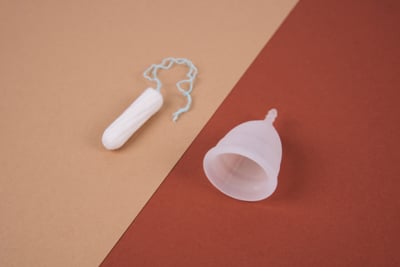 Picture this day: The temperature is expected to reach the mid-80s with sunny skies, and you have a day at the lake planned with the family. The beach bag is packed with your sunblock, towel, and hat. The cooler is full of refreshing drinks, snacks, and plenty of ice. It’s looking like it’s going to be a perfect day until you change into your swimsuit and realize you got your period.
Picture this day: The temperature is expected to reach the mid-80s with sunny skies, and you have a day at the lake planned with the family. The beach bag is packed with your sunblock, towel, and hat. The cooler is full of refreshing drinks, snacks, and plenty of ice. It’s looking like it’s going to be a perfect day until you change into your swimsuit and realize you got your period.
For many women, this can be a deal-breaker for summer water fun. You may be considering canceling your plans or changing into a tank top and shorts and staying on the beach jealously eyeing those having fun in the water. But you don’t have to.
A common myth is that women cannot swim while it’s their “time of the month,” but that’s all it is. You absolutely can enjoy taking a dip in a lake or pool when you have your period. There are a few things to take into consideration to make this happen without having the embarrassment of a leak.
 The biggest fear of swimming with your period is it leaking and showing on your swimsuit. For some women, the water pressure of a lake or pool can be enough to prevent menstrual flow. However, it’s not enough to completely stop it, and while you are in the water, you are usually moving around and causing pressure on the abdominal muscles that may cause some leaking.
The biggest fear of swimming with your period is it leaking and showing on your swimsuit. For some women, the water pressure of a lake or pool can be enough to prevent menstrual flow. However, it’s not enough to completely stop it, and while you are in the water, you are usually moving around and causing pressure on the abdominal muscles that may cause some leaking.
While it is not recommended to swim with a sanitary pad in place, both tampons and menstrual cups are completely safe to use internally. Many competitive swimmers use these options when participating in practices or events on their period. Period-friendly swimwear has also recently entered the market as an option.
Tampons
 Most tampons are made of cotton, rayon, or a combination of the two fibers. Organic cotton tampons are new to the market and it's a personal preference on which type to use. Though they may absorb some water, the tampon will still be absorbent to collect flow. Tampons should be inserted prior to entering the water and changed shortly after your time in the water is completed (or during a long break from the water). If you haven’t worn tampons before, you may want to practice wearing one prior to swimming, but only practice when you have your period.
Most tampons are made of cotton, rayon, or a combination of the two fibers. Organic cotton tampons are new to the market and it's a personal preference on which type to use. Though they may absorb some water, the tampon will still be absorbent to collect flow. Tampons should be inserted prior to entering the water and changed shortly after your time in the water is completed (or during a long break from the water). If you haven’t worn tampons before, you may want to practice wearing one prior to swimming, but only practice when you have your period.
Menstrual Cups
These are flexible cups made of rubber or silicone that are inserted inside the vagina to collect blood during your period. Because it doesn’t absorb the menstrual flow, it is able to be removed, emptied, washed, and used again. If you have a fear of your tampon string hanging out of your swimwear, this is a great alternative. Cups can be worn for 4 – 12 hours depending on the brand—read the instructions to fully understand the product and how to use it. This is a cost-effective and less wasteful option but can take some practice to use correctly.
Period-Friendly Swimwear
The thin layers of material, similar to a pad, is built right into the swimwear lining to collect and trap the blood from the menstrual flow. The swimwear can hold as much as two tampons but should be changed and cleaned at least every 12 hours. Read the instructions specific to that garment before washing it to understand how to care for it. Though this may be the priciest option to start, being able to wear it again and again can make this cheaper in the long run.
In addition to the concern of potential leaking during your period, there are a few other myths to debunk.
Myth 1: Swimming on Your Period is Unsanitary
 The chemicals used in most pools are there to keep things clean and help prevent the transmission of bloodborne diseases. The amount of blood loss during a period is between four and 12 teaspoons over the course of a few days. The amount that does leak will be heavily diluted in a lake.
The chemicals used in most pools are there to keep things clean and help prevent the transmission of bloodborne diseases. The amount of blood loss during a period is between four and 12 teaspoons over the course of a few days. The amount that does leak will be heavily diluted in a lake.
Myth 2: My Period Could Cause a Shark Attack
There is zero evidence to prove that swimming in an ocean with sharks while on your period would cause a shark attack. In addition to sharks being able to smell blood, they can also smell urine, sweat, mucus, and other bodily fluids that contain amino acids. Sharks prefer to snack on fish and only attack if they feel they are threatened.
Myth 3: I Can't Swim, I Have Cramps
Research has shown that swimming while on your period can actually reduce your cramps. Aerobic exercise releases endorphins that can act like natural pain killers.
If you have concerns about swimming with your period or what will work best for your menstrual flow, the providers at Moreland OB-GYN are here to help. Schedule an appointment to discuss your options to help you enjoy your summer to the full extent.









